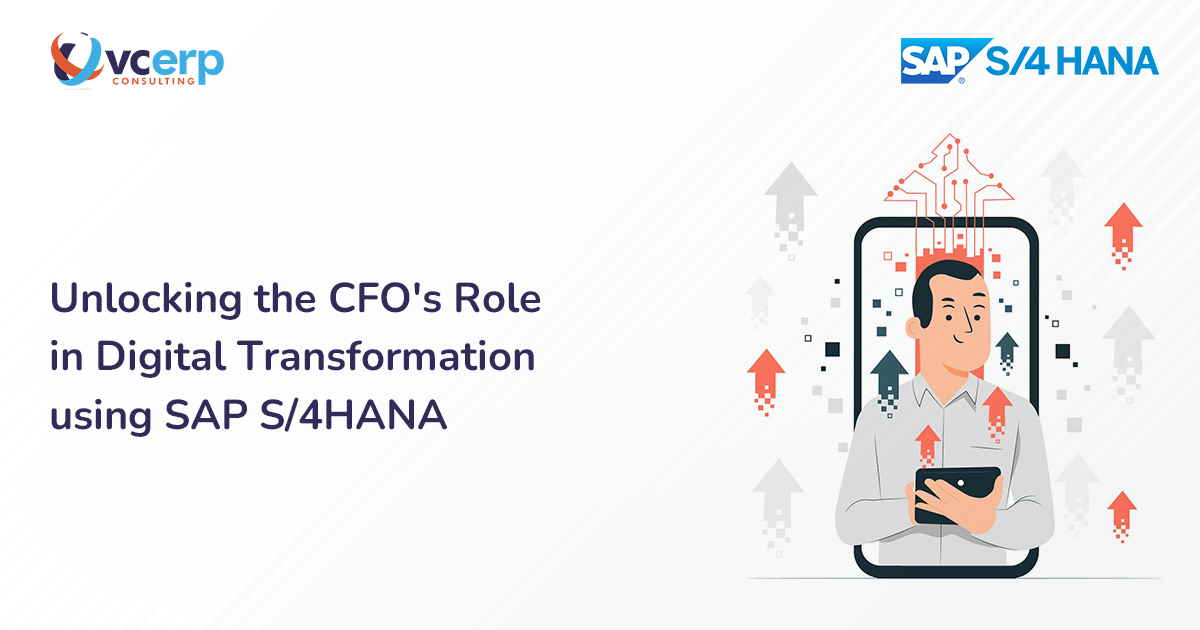
Embracing digital advancements has elevated the role of Chief Financial Officers (CFOs), making them pivotal in driving organizational digital transformation.
The role of CFO is no longer confined to solely focusing on number-crunching and financial reporting. CFOs must now possess a deep understanding of how technology can drive growth and efficiency within their company.
CFOs are required to develop change management skills and stay updated on areas like software development, system implementation, and big data analytics.
Whether it’s creating a strategic plan for digital transformation, overseeing the implementation of new systems, or monitoring performance against goals, the CFO plays a crucial role in driving digital initiatives.
In this FAQ article, SAP S/4HANA Experts at VC ERP Consulting discuss some key questions and answers to help you grasp the challenging decisions that CFOs face when future-proofing their organizations.
What does Financial Digital Transformation entail?
Financial digital transformation refers to using technology to enhance financial operations. It involves –- Automating finance processes
- Simplifying data collection and storage
- Improving reporting methods
How does the CFO contribute to digital transformation within an organization?
The CFO plays a critical role in the successful implementation of SAP S/4HANA as part of the digital transformation journey. As the financial leader of the organization, the CFO must ensure that the implementation of SAP S/4HANA aligns with the company’s strategic objectives and financial goals.
The CFO collaborates closely with the IT department and other stakeholders to evaluate the financial implications of implementing SAP S/4HANA, including the costs involved, potential return on investment and the impact on the company’s financial processes.
Additionally, the CFO oversees the budgeting and financial planning aspects of the SAP S/4HANA implementation, ensuring that sufficient funds are allocated for the project and that financial resources are effectively managed throughout the implementation process.
Furthermore, the CFO plays a vital role in change management, helping to drive adoption of SAP S/4HANA across the organization and ensuring that the financial team is equipped with the necessary skills and training to utilize the new system effectively.
The CFO contributes to the overall success of the digital transformation journey and enables the company to leverage the benefits of the advanced ERP system for improved financial management and decision-making by actively engaging in the implementation of SAP S/4HANA.
What steps can CFOs take to effectively prepare for digital transformation?
CFOs play a crucial role in financial digital transformation. Here are key steps for their successful preparation:Assess current financial processes and identify areas for improvement
CFOs should evaluate the organization’s current financial processes and determine how well they align with the capabilities of SAP S/4HANA. Identifying areas for improvement and understanding the potential impact of the new system is crucial.Analyze financial data quality and consider necessary updates
CFOs should analyze the quality and integrity of financial data to ensure it is accurate, complete, and compatible with SAP S/4HANA requirements. This analysis helps in identifying any necessary updates or data cleansing processes that need to be undertaken.Develop a detailed roadmap for digital transformation
For successful financial digital transformation, CFOs should create a prioritized roadmap that outlines steps, timelines and technologies needed for successful SAP S/4HANA implementation. The plan should address change management, project implementation and securing buy-in from internal stakeholders.Invest in appropriate technology and automation tools after thorough research
After mapping out the digital transformation roadmap, CFOs should research and invest in various functionalities and modules offered by SAP S/4HANA to identify the ones that best suit their organization’s financial needs. This includes considering modules for financial accounting, controlling, treasury management and more.Plan for change management and stakeholder buy-in
CFOs should ensure that change management strategies are in place to support the adoption of SAP S/4HANA across the organization. This includes securing buy-in from internal stakeholders, providing training and support, and addressing any concerns or resistance to change.What Advantages does Digital Transformation Offer?
SAP S/4HANA is a next-generation ERP system that is designed to streamline and optimize business processes through its advanced features and capabilities.
By implementing SAP S/4HANA, companies can benefit from real-time analytics and insights, enabling data-driven decision-making. It helps the CFO and the finance team to gain a deeper understanding of financial performance, identify trends, and forecast future outcomes with greater accuracy. The availability of real-time data also enables faster financial reporting and compliance with regulatory requirements.
Furthermore, SAP S/4HANA integrates various business functions, such as finance, supply chain, sales, and procurement into a single unified system. It eliminates data silos and enables end-to-end visibility across the organization, providing the CFO with a comprehensive view of the financial health of the company.
In addition, SAP S/4HANA also supports digital workflows and automation, reducing manual efforts and increasing operational efficiency. It enables intelligent automation of repetitive tasks, such as invoice processing and financial close activities, freeing up finance resources to focus on more value-added activities.
What are the potential risks related to digital transformation?
Digital transformation is a common goal for many companies to enhance efficiency and stay competitive in the evolving business landscape. However, it’s important to be aware of the potential risks involved.One significant risk is data security, as the increased collection and storage of data can make businesses more susceptible to cyber-attacks. Collaborating with the IT department is crucial for ensuring proper data protection.
Additional risks include compliance challenges with evolving regulations, the potential for financial fraud and the inability to fully benefit from new opportunities without the necessary skills and resources.
As the CFO, it’s essential to address these risks proactively and implement measures to mitigate them effectively.What steps can the CFO take to reduce risks associated with digital transformation?
The CFO can actively contribute to mitigating risks associated with digital transformation by collaborating with the CIO, allocating resources to security measures, and creating contingency plans. They can also raise risk awareness among senior management and the board, assess risks, develop mitigation plans, and monitor progress alongside the CEO and other leaders.
The CFO supports the success of digital transformation and enables the business to seize new opportunities through strategic investments by taking a proactive approach to risk management.
What obstacles might the CFO encounter when taking the lead in digital transformation?
The CFO may face challenges when leading digital transformation, particularly in managing the budget and navigating potential disruptions to existing business models.Allocating funds wisely and monitoring the financial impact of digital transformation is crucial for maintaining the company’s financial stability.
Staying updated on technology trends and developments is also important to ensure the transformation aligns with the company’s goals and keeps pace with industry advancements.
What steps can the CFO take to promote the success of digital transformation initiatives?
In order to promote the success of implementing SAP S/4HANA, the CFO can take several steps. Firstly, they should develop a clear understanding of what digital transformation entails.Then, working with the executive team, they can create a strategy of implementing this intelligent ERP solution that is designed to maximize ROI. Allocation of appropriate resources and regular monitoring of progress are essential to ensure successful implementation.
The CFO should prioritize a comprehensive understanding of the organization’s data and utilize it to inform decision-making and drive change to ensure success.
Implementing a concise data management strategy tailored to the organization’s needs and stakeholders is crucial. Without a clear understanding of data and a well-defined strategy, achieving successful digital transformation becomes challenging.
Transform into an Intelligent Enterprise with SAP S/4HANA Today!
The role of CFO is rapidly changing in the digital transformation journey. As businesses embrace digitalization, CFOs have the opportunity to take on new responsibilities and play a more active role in driving the transformation process.
SAP S/4HANA Experts at VC ERP Consulting believe that successfully navigating this challenging period can greatly benefit companies seeking to stay ahead of the curve in today’s competitive landscape.
CFOs can bring about significant improvements by leveraging SAP S/4HANA, an intelligent SAP ERP Solution. Automate manual tasks, enhance accuracy and efficiency & reduce costs associated with paper documents and storage and gain access to real-time data analytics ultimately leading to better decision-making.
At VC ERP Consulting, we specialize in providing SAP Solutions that can augment your financial processes. Our dedicated SAP S/4HANA consultants are ready to assist you on your digital transformation journey.
Get in touch with our experts at VC ERP Consulting, the best SAP Gold Partner in India, today. Whatsapp +254 111229970 (Kenya), Call +91 7948998911 (India), Call +1 469 915 6026 (North America) , +974 31239246 (MENA) or drop an E-mail at sayhello@vc-erp.com







